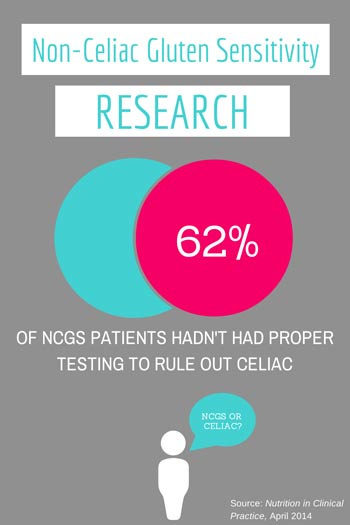Most Gluten Sensitive People Not Getting Proper Testing, Research says
May 8, 2014 by Amy Leger | G+ Amy Leger Many people say they have non-celiac gluten sensitivity. As the name implies, they don’t have celiac disease, but rather an adverse reaction when they eat gluten, many of the symptoms like abdominal pain, diarrhea, foggy brain and join pain are actually similar symptoms to celiac.
Many people say they have non-celiac gluten sensitivity. As the name implies, they don’t have celiac disease, but rather an adverse reaction when they eat gluten, many of the symptoms like abdominal pain, diarrhea, foggy brain and join pain are actually similar symptoms to celiac.
New research published in Nutrition in Clinical Practice reports people say they have non-celiac gluten sensitivity (NCGS), but technically haven’t fulfilled the criteria for that diagnosis.
All 147 patients in this study considered themselves as being gluten sensitive (having NCGS). However, 72% didn’t meet the medical description of NCGS. Of that group, 62% hadn’t had proper testing to rule out celiac disease.
Reuters interviewed Jessica R. Biesiekierski, PhD, RN, the lead researcher in the study. Biesiekierski told Reuters Health that “people with trouble digesting gluten who are not tested for celiac disease may not get proper treatment, which could lead to health problems down the line.”
The report says “The [gluten-free diet] was self-initiated in 44% of respondents; in other respondents it was prescribed by alternative health professionals (21%), dietitians (19%), and general practitioners (16%).” One in four continued to have symptoms despite saying they were gluten free.
Criteria for Gluten Sensitive Diagnosis
What is the criteria? According to Dr. Alessio Fasano at the Center for Celiac Research, there is no proper test for gluten sensitivity at this time. Which means there is not one quick way to find out.
As a result, the common practice is to first do the blood draw for celiac disease to rule celiac in or out. If that test is clearly negative, then, one approach to diagnosis, according to this research published recently in the Journal of Gastroenterology, doctors would consider non-celiac gluten sensitivity and stop further testing. This is where the patient would likely go on a gluten free diet and see if the symptoms subside.
If the celiac blood test does not have a definitive result, then doctors may pursue DNA testing to see if the patient has the HLA DQ2 and/or 8 gene, common in celiac patients. This may also help determine if they should have a biopsy of the small intestine, which is the final and gold-standard test for celiac disease.
The other thing to consider in all this is that if you are already gluten free you will need to be back on gluten in order to get an accurate blood test for celiac.
If you are questioning celiac disease versus gluten sensitivity, see a gastroenterologist familiar with celiac disease. But I would also highly recommend reading Dr. Fasano’s new book Gluten Freedom. It did a great job of discussing the different conditions, with great factual and reliable information that will help educate you and your family.
Tags: blood, celiac, gluten, research, sensitive, sensitivity, serology, test



May 8th, 2014 at 12:55 pm
I’m so glad you talked me into getting John tested before he/we went gf! 🙂
May 8th, 2014 at 1:55 pm
Glad we discussed it!
May 14th, 2014 at 9:33 am
Thank you for the suggestion of Dr. Fasano’s book! I’ve ordered it and looking forward to receiving it.
May 14th, 2014 at 5:23 pm
I am sure you will find it has a wealth of info!